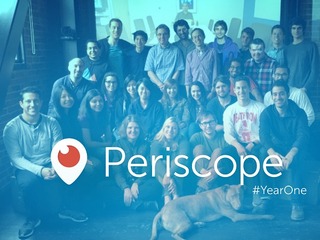Saint Luke's Mid America Heart Institute partners with Story Health on AFib care
Story's AFib program integrates with a health system’s clinical team to keep patients engaged
Read more...
Editor's Note: Our annual Vator Splash Spring 2016 conference is around the corner on May 12, 2016 at the historic Scottish Rite Center in Oakland. Speakers include Tom Griffiths (CPO & Co-founder, FanDuel), Andy Dunn (Founder & CEO, Bonobos), Nirav Tolia (Founder & CEO, NextDoor), Mitch Kapor (Founder, Kapor Center for Social Impact); Founders of Handy, TubeMogul, VSCO, Vinted; Investors from Khosla Ventures, Javelin Venture Partners, Kapor Capital, Greylock, DFJ, IDG, IVP and more. Join us! REGISTER HERE.
When two companies in the same space start stealing features from each other, that's a pretty good sign that things are starting to heat up.
Case in point: Periscope announced on Wednesday, in a Periscope broadcast, that it was adding a new feature that will allow its users to save their streams permanently. Previously, streams could only be saved for 24 hours.
Working on supporting broadcasts beyond 24h! Starting now, you can use our public beta by using #save in your title! https://t.co/LsjqsSib7v
— Periscope TV (@periscopetv) May 5, 2016
In his broadcast, Kayvon Beykpour, CEO of Periscope, said that the feature was "something that clearly the community cares a lot about," given how much time they have been spending on the app.
Users were invited to opt-in to the public beta to try it out. All they have to do is put "#save" in their broadcast title. Anywhere the broadcast was visible before, it will still remain visible, and there are no limits to the number of videos that can be saved.
The full solution will have more controls, Beykpour said, and there will be flexibility in choosing when to save.
In addition to keeping videos longer, the company also said it's working on allowing users to delete their broadcasts in less time as well.
This is a feature that people on Periscope have apparently been asking for, but it also allows the company compete with its biggest rival: Facebook Live, which already had this feature.
Twitter vs Facebook in live video
The companies have been battling it out over live video for the past year or so.
When Periscope first launched last year, its main competition was coming from Meerkat, an app that initially relied exclusively on Twitter. That meant that any live-streams would automatically be sent to the user's Twitter account, rather than giving users the option to post on other social networks.
That decision was likely a smart one for Meerkat in the beginning, but it eventually came back to bite it when Twitter cut the app off from its social graph following its acquisition of Periscope.
In the wake of that decision, many postulated that Facebook might buy Meerkat to compete against Twitter; that, of course, never happened and earlier this month the app revealed that it had pivoted away from livestreaming altogether, choosing instead to become a video social network.
Twitter recently released some impressive numbers for Periscope, which has now grown to over 200 million broadcasts, and over 110 years of live video watched every day across iOS and Android.
Not to be outdone, Facebook introduced a slew of new features to enhance its live video capabilities, turning itself into what can only be described as a live video hub.
That included users being able to broadcast live videos to Facebook Groups and Events, as well as Live Reactions, which let users show how they feel about a broadcast in real-time, using the same Reactions that the company launched in February.
The company also introduced Live Filters, which will let users draw or doodle on your video while live. These are coming soon; The ability to send an invitation to a friend to watch live video with you; and Facebook Live Map on desktop, so users can see what live videos are trending all around the world.
So who will win? According to Twitter, it has some inherent advantages.
"We've been doing live for 10 years and we believe we have a leadership position in it," Twitter CEO Jack Dorsey said in a conference call last week.
"It's about hosting a conversation around a live event. Twitter has always been the best place to see what's happening immediately, to see what's happening instantly, and to bring people together around a particular shared experience."
apparently
Story's AFib program integrates with a health system’s clinical team to keep patients engaged
Read more...Benefits of regular use of Pray.com app included spiritual, mental, and physical improvements
Read more...The company plans to be available to all 33 million Medicare members by the end of the year
Read more...